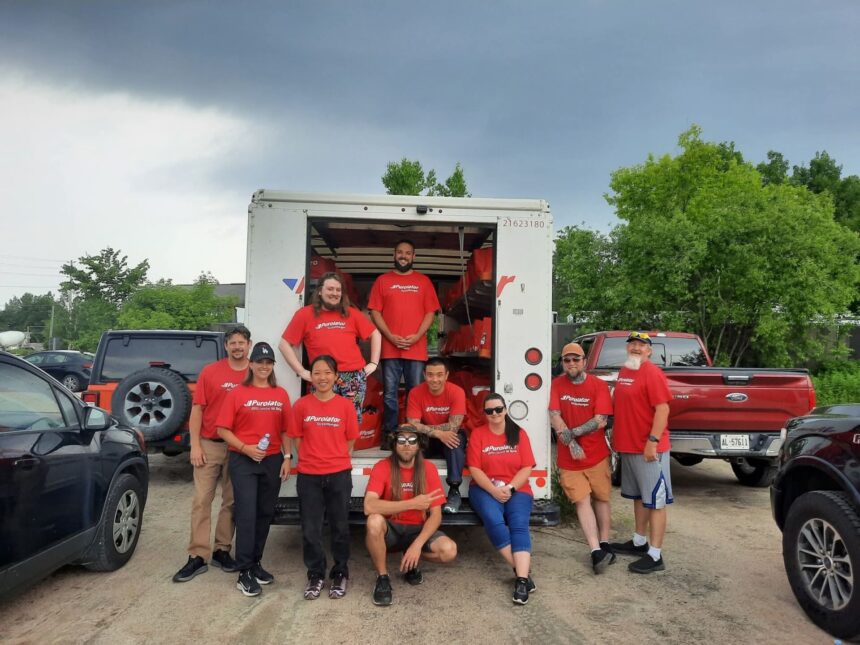In what’s become a late autumn staple, the Purolator Tackle Hunger campaign delivered more than just packages to North Bay last weekend. The annual food drive collected over 5,500 pounds of non-perishable items for the North Bay Food Bank, bringing much-needed relief as local families face mounting grocery bills.
“This couldn’t have come at a better time,” says Debbie Marson, the food bank’s executive director. I met her as volunteers unloaded boxes of pasta, canned goods, and baby formula at their Hammond Street location. “We’re seeing about 30 percent more families this year compared to last, and many are first-time users who never imagined they’d need our services.”
The campaign, which partners with CFL teams nationwide, took a community approach in North Bay. Local Purolator employees joined forces with Nipissing University students and North Bay Battalion hockey fans to collect donations at grocery stores across the city.
Battalion captain Dalyn Wakely joined the effort, helping sort donations. “Some of the guys on the team come from families that struggled when they were younger,” he told me between lifting boxes. “North Bay supports us on the ice—this is how we give back.”
The timing is critical. Food Banks Canada reports a 35% increase in food bank usage since 2019, with Northern Ontario communities seeing even sharper rises. The North Bay Food Bank now serves approximately 1,200 individuals monthly, with nearly a quarter being children under 18.
Kevin Wilson, who’s worked at Purolator’s North Bay distribution center for 12 years, coordinated local volunteers. “We hit every major grocery store in town,” he explained. “People were incredibly generous—we had seniors on fixed incomes giving what they could, and one local business owner dropped off an entire shopping cart.”
The food drive’s success highlights both community spirit and troubling economic realities. According to Statistics Canada, food prices in Ontario have increased by approximately 9% over the past year, forcing difficult decisions for many households.
“I’m seeing working families who have jobs but still can’t make ends meet,” explains Marson. “When housing costs 60% of your income, something has to give, and often it’s the grocery budget.”
The Tackle Hunger campaign, which began in 2003, has now delivered more than 18 million pounds of food to Canadian communities. In North Bay, the impact goes beyond numbers.
Local teacher Ellen Demarco brought her grade five class to help sort donations. “My students need to understand that food insecurity isn’t something that happens somewhere else—it’s right here in our community,” she said. “One boy realized the mac and cheese they were sorting was the same kind his family eats.”
The food bank’s shelves, which had been concerningly bare just days ago, now look healthier. Staples like peanut butter, tuna, and baby formula—always in high demand—arrived in significant quantities.
City councillor Scott Robertson, who volunteered at the collection point outside Parker’s Your Independent Grocer, noted broader implications. “Food insecurity is a symptom of larger issues—housing affordability, stagnant wages, and inadequate social supports,” he said. “While food drives are crucial, we need sustainable solutions.”
Those solutions remain elusive as winter approaches. North Bay’s rental vacancy rate sits below 2%, and average rents have climbed approximately 15% in two years, according to the Canada Mortgage and Housing Corporation.
Meanwhile, the food bank prepares for what could be its busiest holiday season yet. “The donations from Purolator will help get us through to December,” says Marson. “But we’re going to need continued support.”
For Wilson and his Purolator colleagues, the campaign represents their company’s best values. “We deliver packages every day, but this is different,” he said, watching volunteers organize the donations. “Today we delivered hope.”
The North Bay Food Bank accepts donations year-round at their Hammond Street location. They specifically request proteins like canned tuna and peanut butter, along with baby formula and diapers—items that remain in constant demand but are often overlooked in food drives.
As I left the food bank, volunteer Jim Kyte, a retired teacher, was sorting canned vegetables with methodical precision. “I remember when this was a small operation helping maybe a hundred people a month,” he reflected. “The fact we need to feed over a thousand now says something about where we are as a society.”
The Purolator Tackle Hunger campaign may have concluded for another year, but North Bay’s need continues. The 5,500 pounds of food represents both community generosity and a sobering reminder of growing inequality—even in a country as wealthy as Canada.






